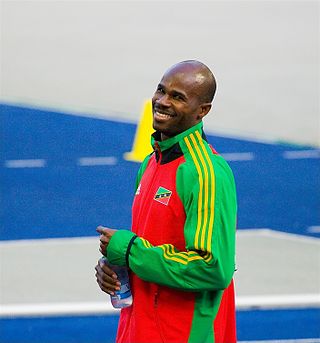
Kim Collins is a former Kittitian track and field sprinter. In 2003, he became the World Champion in the 100 metres. He represented his country at the Summer Olympics on five occasions, from 1996 to 2016, and was the country's first athlete to reach an Olympic final. He competed at ten editions of the World Championships in Athletics, from 1995 to 2015, winning five medals. He was a twice runner-up in the 60 metres at the IAAF World Indoor Championships. At regional level, he was a gold medallist at the Commonwealth Games and a silver medallist at the Pan American Games. As of 2023, he is the only Individual World Championships Gold medallist from Saint Kitts and Nevis.
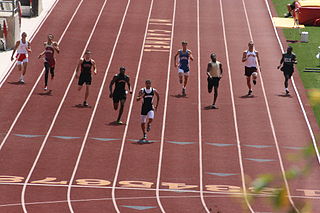
The 400 metres, or 400-meter dash, is a sprint event in track and field competitions. It has been featured in the athletics programme at the Summer Olympics since 1896 for men and since 1964 for women. On a standard outdoor running track, it is one lap around the track. Runners start in staggered positions and race in separate lanes for the entire course. In many countries, athletes previously competed in the 440-yard dash (402.336 m)—which is a quarter of a mile and was referred to as the "quarter-mile"—instead of the 400 m (437.445 yards), though this distance is now obsolete.
The World Athletics Indoor Championships are a biennial indoor track and field competition served as the global championship for that version of the sport. Organised by the World Athletics, the competition was inaugurated as the World Indoor Games in 1985 in Paris, France and were subsequently renamed to IAAF World Indoor Championships in 1987. The current name was adapted with the name change of the sports governing body in 2019.

Meseret Defar Tola is an Ethiopian long-distance runner who competes chiefly in the 3,000 metres and 5,000 metres events. She has won medals at top-tier international competitions including Olympic and World Championship gold medals over 5,000 metres. She broke the world record in the event in 2006, broke it again in 2007 and held it until 2008, when fellow Ethiopian Tirunesh Dibaba beat her time.

60 metres, or 60-meter dash, is a sprint event in track and field. It is a championship event for indoor championships, normally dominated by the best outdoor 100 metres runners. At indoor events, the 60 metres is run on lanes set out in the middle of the 'field', as is the hurdles event over the same distance, thus avoiding some of the effects of the banked track encircling the venue, upon which other track events in indoor events are run. At outdoor venues it is a rare distance, at least for senior athletes. The format of the event is similar to other sprint distances. The sprinters follow three initial instructions: 'on your marks', instructing them to take up position in the starting blocks; 'set', instructing them to adopt a more efficient starting posture, which also isometrically preloads their muscles. This will enable them to start faster. The final instruction is the firing of the starter's pistol. Upon hearing this the sprinters stride forwards from the blocks.

The 1500 metres or 1,500-metre run is the foremost middle distance track event in athletics. The distance has been contested at the Summer Olympics since 1896 and the World Championships in Athletics since 1983. It is equivalent to 1.5 kilometers or approximately 15⁄16 miles. The event is closely associated with its slightly longer cousin, the mile race, from which it derives its nickname "the metric mile".
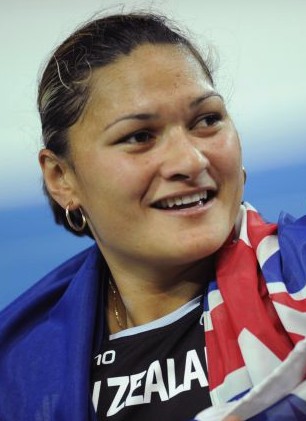
Dame Valerie Kasanita Adams is a retired New Zealand shot putter. She is a four-time World champion, four-time World Indoor champion, two-time Olympic, three-time Commonwealth Games champion and twice IAAF Continental Cup winner. She has a personal best throw of 21.24 metres (69.7 ft) outdoors and 20.98 metres (68.8 ft) indoors. These marks are Oceanian, Commonwealth and New Zealand national records. She also holds the Oceanian junior record (18.93 m) and the Oceanian youth record (17.54 m), as well as the World Championships record, World Indoor Championships record and Commonwealth Games record.

The 3000 metres or 3000-metre run is a track running event, also commonly known as the "3K" or "3K run", where 7.5 laps are run around an outdoor 400 m track, or 15 laps around a 200 m indoor track.

Antonietta Di Martino is a retired Italian high jumper. She currently holds the Italian national women's high jump record at 2.03 metres for outdoor events and 2.04 metres for indoor events. She also currently holds the women's all-time highest jump-differential, meaning she has jumped the highest more than her own height.

Fabiana de Almeida Murer is a retired Brazilian pole vaulter. She holds the South American record in the event with an indoor best of 4.82 m and an outdoor best of 4.87 m, making her the fourth highest vaulter ever at the time, now the eighth. She won the gold medal at the 2011 World Championships in Athletics, at the 2010 IAAF World Indoor Championships and also won at the 2007 Pan American Games. Murer represented Brazil at the 2008, 2012 and 2016 Summer Olympics. She is a four-time South American Champion with wins in 2006, 2007, 2009 and 2011. Murer was coached by both the Ukrainian Vitaly Petrov, who managed the world record holders Sergei Bubka and Yelena Isinbayeva, and her husband, Élson Miranda de Souza, a former vaulter himself.

Genzebe Dibaba Keneni is an Ethiopian middle- and long-distance runner. A 1,500 metres 2016 Rio Olympics silver medalist, she won a gold medal in this event and a bronze in the 5,000 metres at the 2015 World Championships. Genzebe is the current world record holder for the indoor events of the one mile, 3,000m and 5,000m.

Ivana Španović is a Serbian long jumper, the 2023 World champion, a two-time World indoor champion, a two-time European champion, a three-time European indoor champion and a five-time Diamond League Trophy Winner. Considering her achievements and longevity, Ivana Španović is regarded as one of the best all-time female long jumpers, with her indoor 7.24m jump ranked 3rd in all-time records.
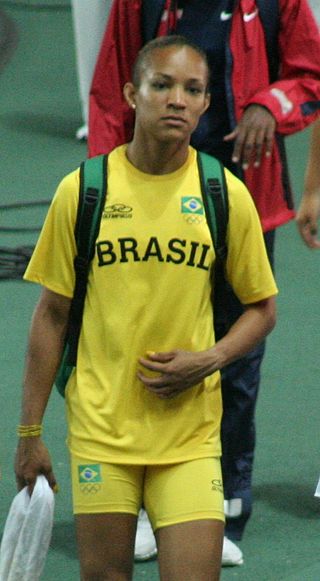
Keila da Silva Costa is a Brazilian long jumper and triple jumper. She has competed in three Olympic Games, 2004, 2008 and 2012, and has reached the final round both there and in World Championships and World Indoor Championships. She is the South American record holder in triple jump with 14.58 metres, and has 6.88 metres in the long jump. Both results were achieved in 2007.

Mariya Aleksandrovna Lasitskene is a Russian athlete who specialises in the high jump. She is the 2020 Olympic champion and three-time world champion. With her victory in Tokyo, Lasitskene became the fourth female high jumper in history to win gold at both the Olympic Games and the World Championships.

Dafne Schippers is a Dutch retired track and field athlete who competed in sprinting and the combined events. She holds the European record in the 200 metres with a time of 21.63 seconds, making her the sixth-fastest woman of all time at this distance. She also holds the Dutch records in the 100 metres and long jump, and shares the Dutch records in the 60 metres indoor and 4 × 100 metres relay.

Brazil competed at the 2011 World Championships in Athletics from August 27 to September 4 in Daegu, South Korea.

Tomas Walsh is a New Zealand athlete who competes mainly in the shot put. He is the current national record holder both outdoors and indoors for the event. His personal best of 22.90 m, set in Doha, 5 October 2019, is also the Oceanian record and makes him the sixth best shot putter in history.
The men's pole vault competition at the 2016 Summer Olympics in Rio de Janeiro, Brazil. The event was held at the Olympic Stadium between 13–15 August. Thirty-one athletes from 16 nations competed. Thiago Braz da Silva of Brazil won the gold medal, the nation's first medal in the men's pole vault. Renaud Lavillenie of France was unable to successfully defend his 2012 gold, but became the seventh man to win two medals with silver this time. Sam Kendricks's bronze returned the United States to the podium after a one-Games absence.
The Balkan Athletics Indoor Championships, also known as the Balkan Indoor Games, is an annual international regional indoor track and field competition between athletes from the Balkans. Following a test event in 1991, it was officially launched in 1994. Organised by the Association of the Balkan Athletics Federations (ABAF), it is typically held in February. The competition complemented the long-running annual outdoor track and field tournament: the Balkan Games.
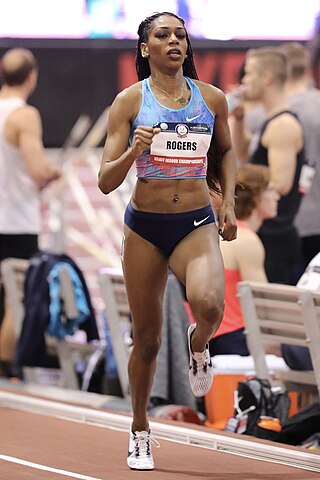
Raevyn Rogers is an American middle-distance athlete. She won a bronze medal in the 800 meters at the 2020 Tokyo Olympics, becoming the fourth fastest woman in U.S. history in the event. At the 2019 World Championships, Rogers came from seventh with 100m remaining in the race to place silver over USA teammate Ajeé Wilson in bronze. She earned a world indoor title as a member of national 4x400 m relay squad that took gold at the 2018 World Indoor Championships.

















